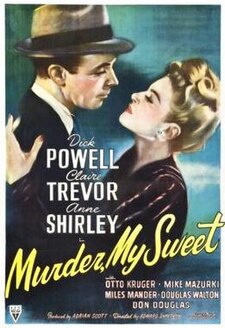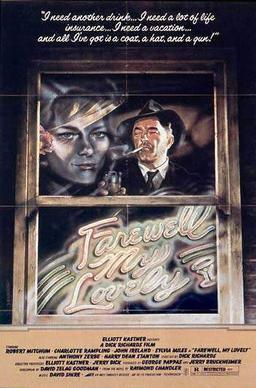Since Aristotle, it's been a common truism that there are no "original" stories; it's ultimately the given details and style that make a telling special(or not, as the case may be). With this idea in mind, I've recently given an overview of the production of several films in the 1970s
that consciously (sometimes self-consciously)
harkened to popular material from the 40s and 50s. Certain films to spring from the neo-noir craze are regarded as major classics, such as Roman Polanski's Chinatown(1974), but I thought I'd shine the spotlight on a well-made largely forgotten entry.
 |
| The 1944 film noir |
 |
The same story, circa 1975
|
Film noir, that genre of private
eyes, treacherous dames, smoky nighttime rooms and corruption in urban America,
saw its heyday at the height of the Hollywood studio system, when the
Production Code was enforced. As a result, writers and directors had to skirt
around the overt depiction of criminal activities, and they did so in often
ingenious ways. By the 70s, with the Code retired and the MPAA ratings system
brought in to replace it, there was an appetite to revisit the haunts of
Raymond Chandler and Dashiell Hammett. Grittier and more upfront in
their depiction of vice than their cinematic forebears, these neo-noirs
nonetheless reveled in the style of pictures like The Maltese Falcon(1940),
Double Indemnity(1944) and The Big Sleep(1945).
 |
| Humphrey Bogart, in The Big Sleep |
Farewell
My Lovely(1975), like The Big Sleep,
is an adaptation of a novel by Raymond Chandler, starring his recurrent
protagonist Phillip Marlowe, a wise-cracking, hard-drinking private
investigator who somehow still nurtures a doggedly moral center. Marlowe had
been played onscreen before by Humphrey Bogart and Elliot Gould, and William Powell in Murder, My Sweet, the 1944 adaptation of Farewell My Lovely.In the 1975 Farewell My Lovely, he is played
by one of the greatest actors from classic noir, Robert Mitchum. Such a casting
choice could easily have been a lazy attempt to phone-in the spirit of screen
detectives past, but it is a credit to director Dick Richards and his star that
it does not. Mitchum, himself an alcoholic with a penchant for sardonic remarks,
seems to infuse these qualities into his performance; his Marlowe has a fine
blend of amusement, toughness and unexpected tenderness. Fifty seven years old
at the time the film was made, Mitchum grants the character a quality of
weariness distinct from other interpretations. His performance is the anchor of
the film and the key to raising it above simple homage and into a realized
story of its own.
 |
| Robert Mitchum in Farewell My Lovely |
The plot concerns Marlowe taking on
the job of locating the missing girlfriend of gangster Moose Malloy (Jack
O’Halloran, appropriately hulking and meaty). The search leads him into the
underbelly of 1941 Los Angeles, with the plot becoming more and more tangled
the deeper he goes. The characters he encounters offer indelible bits of
corruption or decay, though they are none the less gripping for this. The ex-nightclub
performer lush played by Sylvia Miles and a very dangerous madam played by
Frances Amthor both complicate things for Marlowe, as does a very young, pre-Rocky Sylvester Stallone. But the
biggest complication just may be Helen Grayle(Charlotte Rampling, recently an Academy Award nominee for 45 Years), the wife of a wealthy man who may or may not be more than she seems. Rampling clearly
evokes memories of Lauren Bacall or Barbara Stanwyck with her icy streamlined
beauty and barbed witticisms, but she doesn’t suffer by the comparison, if only
because her channeling of the femme fatale
contributes so effectively to the overall atmosphere.
Atmosphere
is the key word with film noir, and Farewell
My Lovely delivers it in spades. John A Alonzo’s cinematography provides
rich neon-drenched streets, and David Shire’s music features the lonesome
trumpets and sax rhythms a viewer would naturally associate with a film set in
40s Los Angeles. If you're interested in sampling how the flavor of the same story can vary in this most American of genres, serve up a double-bill of Murder, My Sweet and Farewell, My Lovely.
 |
| Mitchum and Charlotte Rampling |





No comments:
Post a Comment